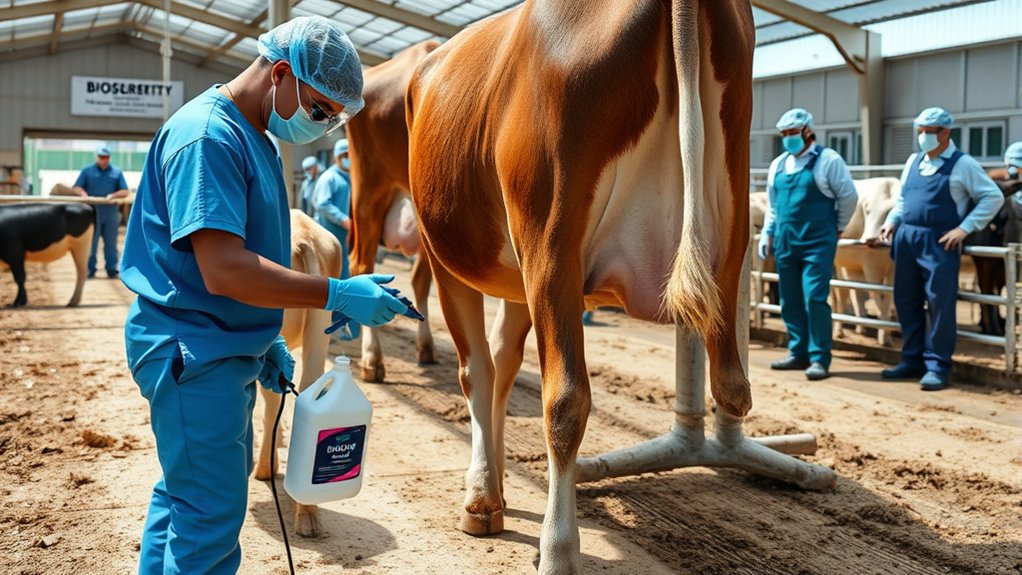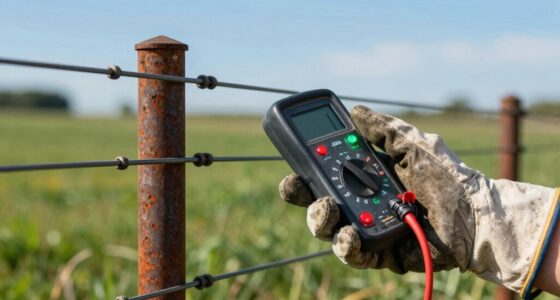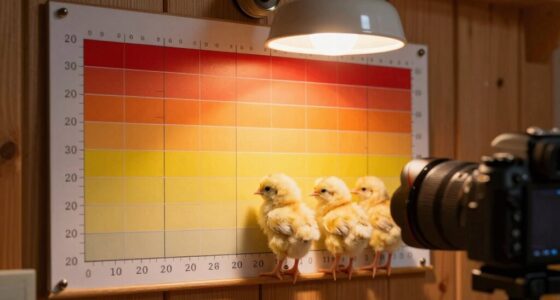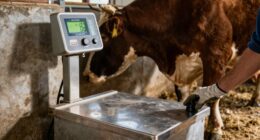To reduce disease spread on your farm, implement strict biosecurity measures like quarantining new or sick animals for at least 30 days and closely monitoring their health. Guarantee proper hygiene by regularly cleaning equipment and housing, and control pests that can transmit illnesses. Vaccinate your animals against common diseases and maintain detailed records. Limiting visitor access and disinfecting footwear also help prevent contamination. Continue exploring these practices to create a safer environment for your animals.
Key Takeaways
- Implement strict quarantine protocols for new or sick animals to prevent disease introduction.
- Maintain rigorous hygiene practices, including regular cleaning and disinfection of equipment and facilities.
- Develop and follow a consistent vaccination schedule tailored to local disease risks.
- Limit visitor access and enforce biosecurity measures like protective clothing and footwear disinfection.
- Conduct routine health monitoring and collaborate with veterinarians for early detection and response.
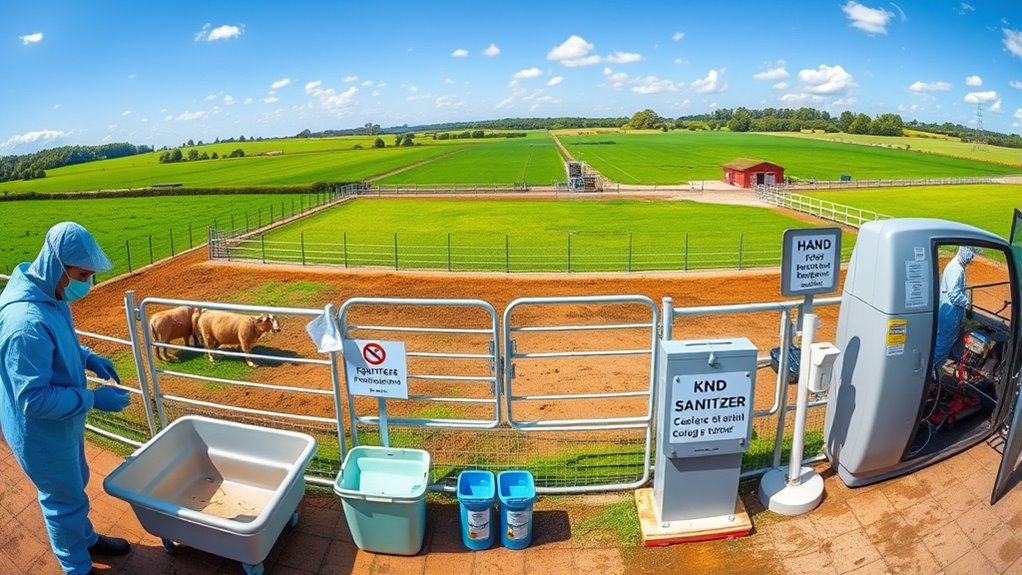
Implementing effective biosecurity measures is fundamental to protect your farm animals from infectious diseases and maintain a healthy herd. One of the most critical steps is establishing strict quarantine protocols for new or sick animals. When you bring in new animals, isolate them from the rest of the herd for at least 30 days. During this period, monitor them closely for signs of illness, and avoid sharing equipment or facilities. This reduces the risk of introducing pathogens into your established herd. If any animal shows symptoms, promptly consult your veterinarian and follow appropriate treatment protocols. Quarantine acts as a buffer, preventing potential disease spread and giving you time to assess health risks before reintegrating new arrivals. Establishing consistent routines can also help in early detection of health issues, as familiar patterns make abnormalities more noticeable.
Vaccination strategies also play an important role in biosecurity. Vaccinating your animals against common infectious diseases helps create herd immunity, reducing the likelihood of outbreaks. You should develop a vaccination schedule based on your farm’s location, the prevalent diseases in your area, and expert veterinary advice. Consistency is key—skip vaccinations, and you weaken your herd’s defenses. Make sure your vaccines are stored properly and administered correctly to maximize their effectiveness. Keep thorough records of all vaccinations to track coverage and identify any gaps in immunity. Combining vaccination with good hygiene and management practices creates a robust defense against disease.
Beyond quarantine and vaccination, maintaining strict hygiene practices is essential. Regularly clean and disinfect feeding equipment, water troughs, and housing facilities to eliminate potential sources of infection. Limit visitors and ensure they adhere to biosecurity protocols, such as wearing protective clothing and disinfecting footwear. Controlling pests like rodents and insects is also critical, as they can carry and transmit diseases. Proper disposal of manure and dead animals prevents contamination of soil and water sources, further reducing infection risks.
You should also be vigilant about your herd’s health status by conducting routine health checks and working with your veterinarian for disease testing. Early detection of illness allows for swift action, minimizing spread. Educate everyone involved with your farm about biosecurity principles so they understand their role in disease prevention. Implementing these measures consistently may require effort and discipline, but they’re necessary investments in your farm’s productivity and the health of your animals. When you prioritize biosecurity, you create a safer environment that keeps your herd healthy, productive, and less vulnerable to devastating outbreaks.
Frequently Asked Questions
How Often Should Biosecurity Protocols Be Reviewed and Updated?
You should review and update your biosecurity protocols at least annually, or more often if there are changes in your farm operations or new disease threats emerge. Regular protocol updates guarantee your staff stays informed about current best practices. Consistent staff training complements these updates, reinforcing proper biosecurity measures. Staying proactive helps prevent disease spread effectively, keeping your farm healthy and productive.
What Training Is Recommended for Farm Staff on Biosecurity?
Think of training as arming your farm staff with a shield against disease. You should train them on proper hygiene practices, like handwashing and sanitation, and emergency preparedness, so they’re ready to act swiftly if an outbreak occurs. Regular workshops and hands-on demonstrations keep skills sharp. By doing so, you create a vigilant team that understands biosecurity’s importance and can respond confidently, safeguarding your animals’ health and your farm’s future.
Are There Cost-Effective Biosecurity Options for Small Farms?
You can implement affordable solutions like simple sanitation routines, proper fencing, and controlled access to your farm. Participating in community programs often provides cost-effective resources and shared knowledge, helping you enhance biosecurity without overspending. These strategies are easy to adopt, reduce disease risks, and protect your animals effectively. By leveraging local resources and affordable practices, you can maintain good biosecurity on your small farm without significant expense.
How Can Visitors Be Safely Managed to Prevent Disease Introduction?
You can safely manage visitors by implementing strict access control and visitor screening protocols. Require all visitors to sign in, wear protective clothing, and sanitize hands upon entry. Limit access to essential areas only, and keep a record of visitors for contact tracing if needed. Educate visitors about farm biosecurity practices, ensuring they understand the importance of following these measures to prevent disease introduction and protect your animals effectively.
What Are the Signs of Biosecurity Breaches Among Farm Animals?
Imagine your farm animals suddenly acting off, with feverish chills or sluggish movements. These are clear disease symptoms that signal a breach. Watch for unusual discharges, swollen lymph nodes, or sudden drops in productivity. Breach indicators also include unexpected changes in behavior, contamination of feed or water, and unexplained deaths. Spotting these signs early helps you act fast, preventing disease from spreading and protecting your herd’s health.
Conclusion
By implementing these biosecurity measures, you can create a shield around your farm animals, much like a fortress guarding its treasure. Staying vigilant and practicing strict sanitation, controlling access, and monitoring health helps prevent disease spread. Remember, just as a single weak link can break a chain, neglecting biosecurity can lead to outbreaks. Stay proactive, keep your animals safe, and protect your farm’s future with these essential steps. Your efforts make all the difference in maintaining a healthy, thriving farm.

